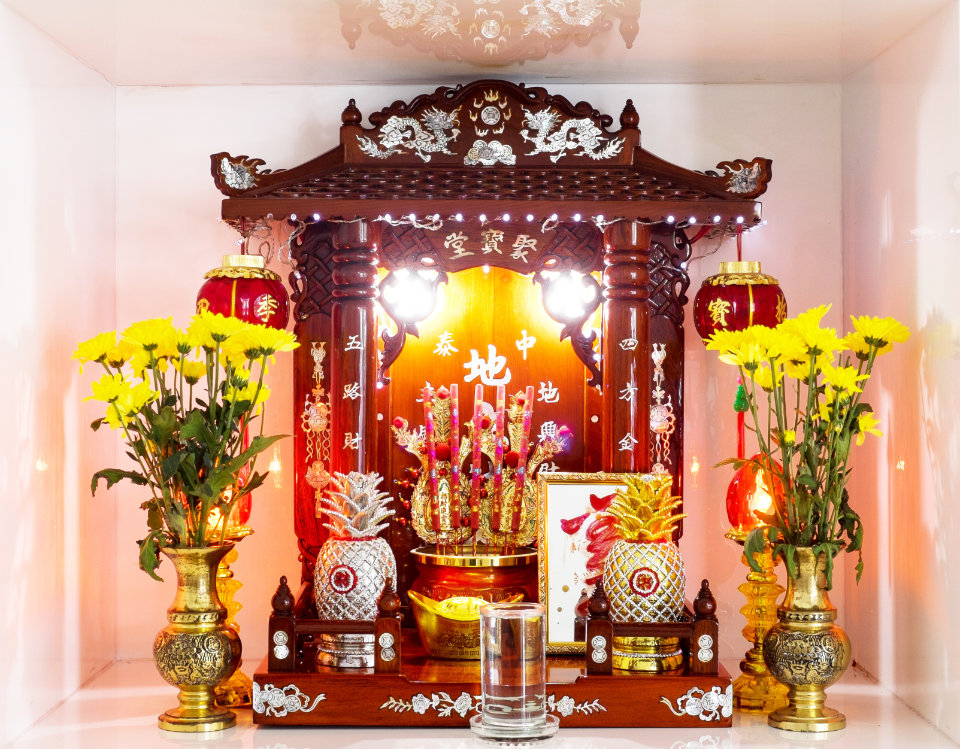Many people have altars in their homes to worship deities and honor their ancestors. As a sacred space, the placement of the home altar Feng Shui is subject to much consideration and attention to detail.
Sometimes, we might think the location of the home altar is fine, but in reality, we could be making serious feng shui mistakes.
If the placement of the home altar is incorrect, it can affect the fortune of the entire household. It might even cause the deities to leave, so one must be extremely cautious and respectful regarding the placement of the altar.
If the altar is positioned correctly, it can boost the fortune of the entire family, ensuring everyone is blessed with safety and success in all endeavors.
Let’s now look at the three feng shui taboos and three recommended positions for the home altar Feng Shui.
Table of Contents
The Three Suitable Positions for the Home Altar Feng Shui
In feng shui, when setting up a space for worship in a home, the best position for the altar is facing the front door, with its back against a wall, and placed in a quiet area.
This does not disturb the deities and is also better for the household’s fortune.
First: The Altar Should Face the Front Door
An altar inside the home facing the front door signifies “seeing the Buddha upon opening the door.” Such a placement helps the deities worshipped at home to block “unclean” forces from entering, serving as a barrier against evil spirits.
The altar should not be too close to the front door, as the constant opening and closing can disturb the tranquility of the deities.
Also, seeing the altar immediately upon entering can sometimes be startling, especially in situations like returning home late after drinking.
If the home altar faces the front door, remember to pay respects with hands clasped in prayer upon entering to show reverence.
Second: The Altar Should Have its Back Against a Wall
Essentially, the home altar must have its back against a wall because in feng shui this represents having a “mountain behind” you, which enables the deities to bless you and your family’s fortune. With a stable “mountain” behind, your wealth will also become prosperous.
However, the wall that the altar leans against must be carefully considered; it cannot be just any makeshift board.
To enhance fortune and luck, the wall behind the altar must be solid and even. It also has to be a solid wall, not hollow, or else your pockets will also become empty.
Third: The Altar Should Be Placed in a Quiet Area
Think about it, if deities are placed in a noisy area, would they want to remain there? Of course not! Because the deities are often disturbed by the noise, they will likely leave their position.
Without the deities’ blessing, the household’s career and wealth fortunes will be affected. Therefore, remember to find a relatively quiet spot for the altar at home, as this is a form of respect for the deities.

The Three Feng Shui Taboos for Home Altars Feng Shui
First: The Altar Should Not Face a Wall
Placing the altar so that it faces a wall is like asking the deities to “face the wall in penance,” which is disrespectful. Moreover, if the altar faces a wall, it symbolizes that the deities cannot see the path ahead, leading to you and your family being unable to see your future paths.
This can adversely affect your prospects, leading to frequent setbacks in life and career, lack of goals, and a sense of losing oneself. Therefore, the correct practice is to have the altar “sit inside facing out,” allowing it to face the direction of the front door.
This way, the deities can bless you, ensuring a bright future, smooth endeavors, and abundant wealth.
Second: The Altar Should Not Back Onto a Bathroom Wall
While it is true that an altar needs to have its back against a wall for good feng shui, not just any wall will do. For instance, the wall of a bathroom should be avoided. This is because the bathroom is considered a place of filth, often filled with foul air, humidity, dampness, and unpleasant odors, whereas deities represent sanctity and purity.
Therefore, the altar must not be placed near such unclean and damp places, as this is disrespectful to the deities and may cause them to leave their place. Additionally, in feng shui, the altar and the bathroom clash elementally.
The altar is associated with the “fire” element, while the bathroom corresponds to the “water” element, and as the saying goes, “water and fire do not mix.”
Placing the two together can lead to constant unrest at home, frequent quarrels among family members, and a decline in fortune, making it difficult to accumulate wealth.
Third: A Major Taboo is for the Altar to Back Onto a Bed!
Furthermore, having the altar back onto a bed can also have a negative impact on us. The “spiritual waves” emitted by the deities and ancestors can cause a decline in sleep quality, leading to poor mental health, increased susceptibility to illness, and a tendency towards chaotic thoughts.
Therefore, the wall that the altar backs onto should not also back onto a bed, as this can affect the relationship between spouses, as well as health and financial fortune.
Place Your Home Altar Correctly
Having reviewed the above six points about altar feng shui, remember not to commit these feng shui taboos when installing or placing an altar at home.
The altar is a sacred space for worshipping deities, so it’s important to pay extra attention to altar feng shui and its placement.
A misplaced altar can directly affect the feng shui and fortune of the home, bringing misfortune. If you want a harmonious personal and professional life, prosperous wealth, the support of helpful people, and good health, place the altar in a quiet and clean area.
When the deities feel your respect, they will naturally bless your fortune and ensure that your journey is smooth sailing!
What are the basic principles of Home Altar Feng Shui?
The basic principles involve positioning the altar facing the front door, ensuring it has a solid wall behind, and placing it in a quiet area to invite positive energy and blessings into the home.
How can Home Altar Feng Shui affect my family’s well-being?
Proper Home Altar Feng Shui can enhance harmony, protect against negative energies, and improve the overall well-being and fortune of your family.
Why should the Home Altar not face a bathroom in Feng Shui?
In Home Altar Feng Shui, the altar should not face a bathroom due to the negative energy and elemental clash that can disrupt the purity and sanctity of the altar space.
Can the wrong Home Altar placement lead to financial issues?
Yes, incorrect placement according to Home Altar Feng Shui principles can block positive energy flows, potentially leading to financial difficulties.
Is it important for Home Altar Feng Shui to avoid placing the altar near the bed?
Yes, for optimal Home Altar Feng Shui, it’s important to avoid placing the altar too close to a bed to prevent disturbances in sleep and personal energy.
What is the significance of the altar’s wall in Home Altar Feng Shui?
The wall represents support and stability in Home Altar Feng Shui; hence, a solid wall behind the altar symbolizes a “mountain” that protects and strengthens the household’s energy.
How does the direction of the Home Altar impact Feng Shui?
The direction the altar faces can draw in auspicious energy, with the ideal direction being towards the front door for welcoming positive chi into the home.
What should I avoid placing on my Home Altar according to Feng Shui?
In Home Altar Feng Shui, avoid clutter, items associated with negative energy, or those that do not honor the spiritual significance of the altar space.




1 Comment
I need to be a member